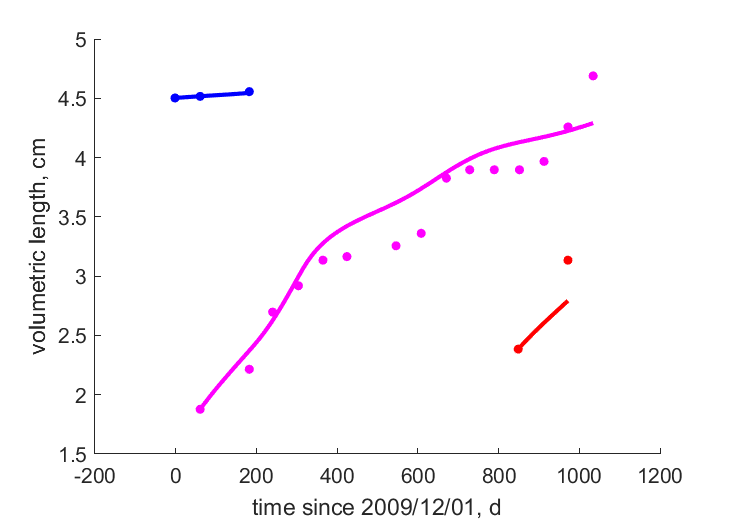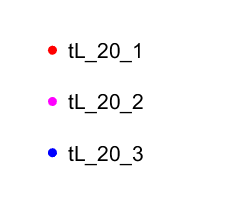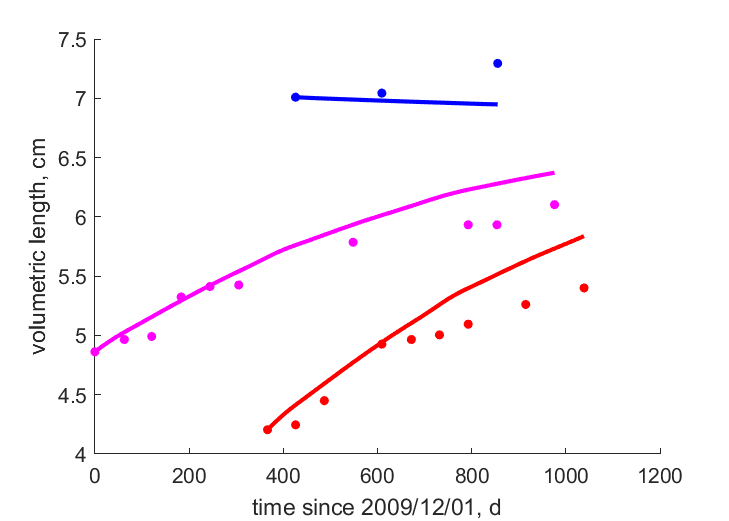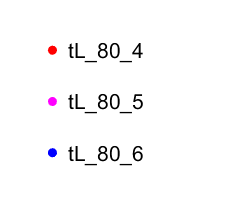Predictions & Data for this entry
| Model: abj | climate: MB, MC | migrate: | phylum: |
| COMPLETE = 3.0 | ecozone: MAE, MAm | food: biPz, bjCim | class: |
| MRE = 0.075 | habitat: 0jMcp, jiMb | gender: D | order: |
| SMSE = 0.022 | embryo: Mp | reprod: O | family: |
Zero-variate data
| Data | Observed | Predicted | (RE) | Unit | Description | Reference |
|---|---|---|---|---|---|---|
| tj | 80 | 69.69 | (0.1288) | d | time since birth at metam | BaetGali2016 |
| tp | 547.5 | 474.3 | (0.1338) | d | time since birth at puberty | BaetGali2016 |
| am | 1825 | 1808 | (0.009385) | d | life span | guess |
| Wwb | 4.2e-06 | 4.317e-06 | (0.0278) | g | wet weight at birth | guess |
| Wwj | 0.0225 | 0.02286 | (0.01591) | g | wet weight at metam | HeinNebe2004 |
| Wwp | 94 | 56.53 | (0.3986) | g | wet weight at puberty | BaetGali2016 |
| Wwi | 500 | 559.6 | (0.1193) | g | ultimate wet weight | BaetGali2016 |
| GSI | 0.5 | 0.4923 | (0.01535) | g/g | gonado somatic index | BaetGali2016 |
Uni- and bivariate data
| Data | Figure | Independent variable | Dependent variable | (RE) | Reference |
|---|---|---|---|---|---|
| tL_20_1 |   | time since 2009/12/01 | volumetric length | (0.0621) | BaetGali2016 |
| tL_20_2 |   | time since 2009/12/01 | volumetric length | (0.0518) | BaetGali2016 |
| tL_20_3 |   | time since 2009/12/01 | volumetric length | (0.0008616) | BaetGali2016 |
| tL_80_4 |   | time since 2009/12/01 | volumetric length | (0.04206) | BaetGali2016 |
| tL_80_5 |   | time since 2009/12/01 | volumetric length | (0.02638) | BaetGali2016 |
| tL_80_6 |   | time since 2009/12/01 | volumetric length | (0.0192) | BaetGali2016 |
Pseudo-data at Tref = 20°C
| Data | Generalised animal | Astropecten aranciacus | Unit | Description |
|---|---|---|---|---|
| v | 0.02 | 0.01952 | cm/d | energy conductance |
| p_M | 18 | 21.66 | J/d.cm^3 | vol-spec som maint |
| k_J | 0.002 | 0.002 | 1/d | maturity maint rate coefficient |
| k | 0.3 | 0.2173 | - | maintenance ratio |
| kap | 0.8 | 0.2925 | - | allocation fraction to soma |
| kap_G | 0.8 | 0.8 | - | growth efficiency |
| kap_R | 0.95 | 0.95 | - | reproduction efficiency |
Discussion
- Because this species changes shape during growth, arm length was converted to volumetric length
Facts
- dioecious, which means that each individual is either male or female (Ref: Wiki)
- length-weight: W in g = 0.0025 * (major radius length in mm)^2.22; becomes relatively more slender as it grows (Ref: BaetGali2016)
- In the study area it feeds mainly on the bivalves Glycymeris glycymeris and Callista chione, together with the gastropod Cyclope neritea between 5 and 30 m depth and almost exclusively on the bivalve Timoclea ovata between 50 and 200 m depth (Ref: BaetGali2016)
Bibliography